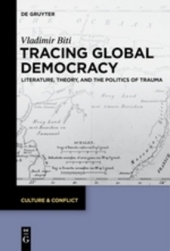 Neuerscheinungen 2017Stand: 2020-02-01 |
Schnellsuche
ISBN/Stichwort/Autor
|
Herderstraße 10
10625 Berlin
Tel.: 030 315 714 16
Fax 030 315 714 14
info@buchspektrum.de |

Vladimir Biti
Tracing Global Democracy
Literature, Theory, and the Politics of Trauma
2017. IX, 394 S. 230 mm
Verlag/Jahr: DE GRUYTER 2017
ISBN: 3-11-057782-8 (3110577828)
Neue ISBN: 978-3-11-057782-2 (9783110577822)
Preis und Lieferzeit: Bitte klicken
Culture and conflict unavoidably go together. The very idea of culture is marked by the notion of difference and creative, i.e. conflictual, interaction that inevitably support the key themes of the study of culture such as identity and diversity, memory and trauma, the translation of cultures and globalization, dislocation and emplacement, mediation and exclusion. This series publishes theoretically informed original scholarship from the fields of literary and cultural studies as well as media, visual and film studies, fostering a plural disciplinary dialogue on the multiple ways in which conflict supports and constrains the production of meaning in modernity, how the representation of conflict works, how it relates to the past and projects the present and how it frames scholarship within the humanities.
Editors:
Isabel Capeloa Gil , Catholic University of Portugal, Lisbon, Portugal; Paulo de Medeiros , University of Warwick, UK, Catherine Nesci , University of California, Santa Barbara, USA.
Editorial Board:
Arjun Appadurai, New York University,
Claudia Benthien, Universität Hamburg,
Elisabeth Bronfen, Universität Zürich,
Bishnupriya Ghosh, University of California, Santa Barbara,
Joyce Goggin, Universiteit van Amsterdam,
Lawrence Grossberg, University of North Carolina at Chapel Hill,
Andreas Huyssen, Columbia University,
Ansgar Nünning, Universität Gießen,
Naomi Segal, University of London, Birkbeck College,
Márcio Seligmann-Silva, Universidade Estadual de Campinas,
António Sousa Ribeiro, Universidade de Coimbra,
Roberto Vecchi, Universita di Bologna,
Samuel Weber, Northwestern University,
Liliane Weissberg, University of Pennsylvania,
Christoph Wulf, FU Berlin,
Longxi Zhang, City University of Hong Kong
Focused on the recently hotly debated topic at the crossroads of various human and social sciences, this book investigates the emergence of the cosmopolitan idea of literature and its impact on the reconfiguration of the European and non-European political spaces. The birthplace of this idea is its designers´ traumatic experience as induced by the disconcerting condition of their abode.The thesis is that the eighteenth and nineteenth century´s cosmopolitan projects that grow out of such deep frustrations trace the twentieth century´s global democracy. This hidden origin of cosmopolitan projects dismantles the usual European representation of modernization as universal progress as myopic. Rather than being a generous action of prominent subjects such as Voltaire, Kant, and Goethe, or Bakhtin, Derrida and Deleuze, cosmopolitanism is an enforced reaction of the instances dispossessed by injury that search for the ways of healing it. Yet as soon as their remedy establishes itself as the ground for universal reconciliation, it risks suppressing other´s trauma, i.e. turns from politics into a police. Articulating the author´s position in the recent debates on the structure of democracy, the epilogue suggests an alternative strategy.
"Vladimir Biti´s new book is a challenging read. To readers acquainted with his earlier publications this comes as no surprise; rather it confirms that Biti persists with the same rigor in his engagement with the past and present of human thinking. Nor does he in his new book relent with the demands he consistently makes of his readers. The minimum requirement to join him in his forays into thinking is an acquaintance with the greater part of Western thought."Stipe Grgas in: Umjetnost rijeci LIX, 1-2 (2015)


